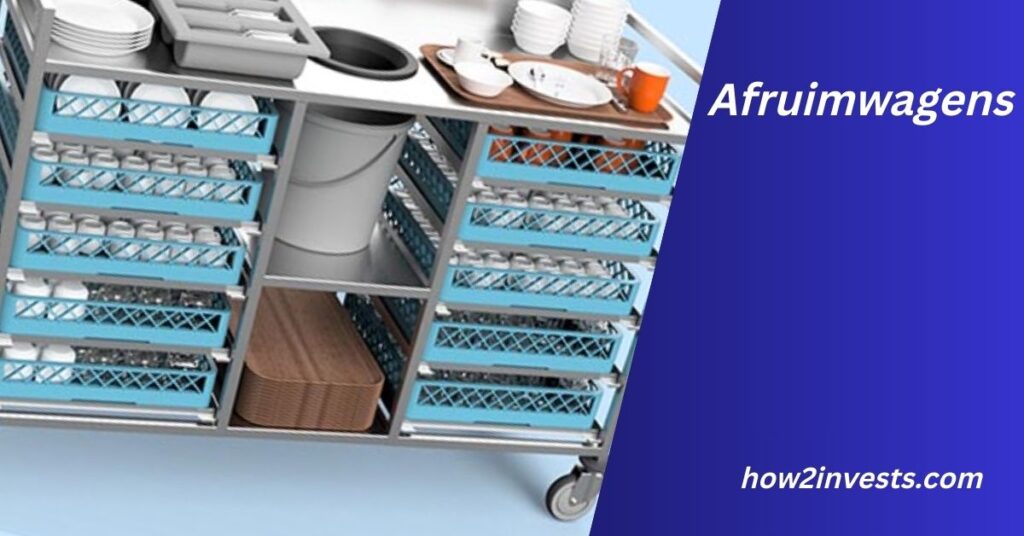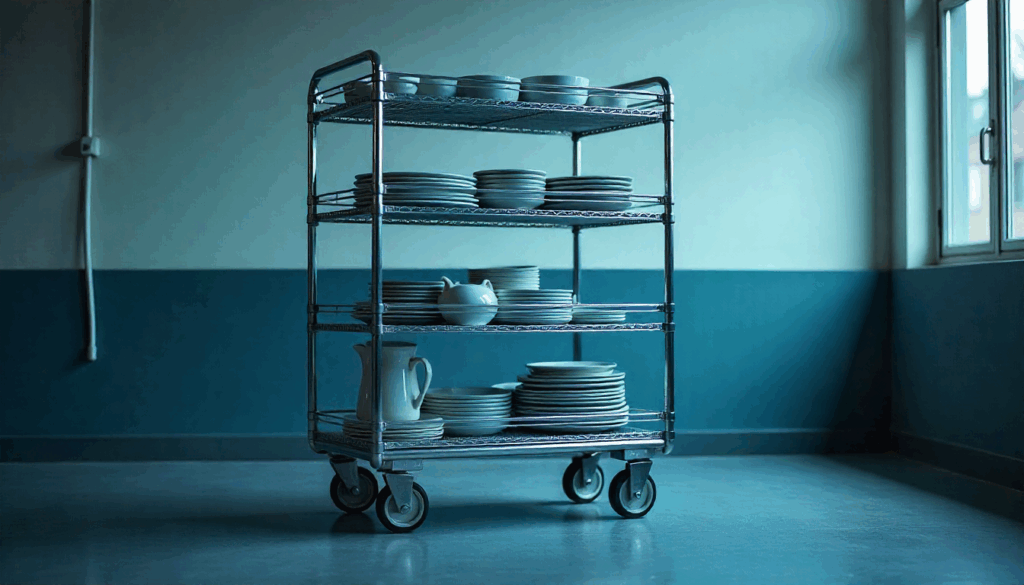Afruimwagens: The Complete Guide to Clearing Carts for Restaurants, Hotels, and More

In the world of hospitality, efficiency is everything. Whether it’s a busy restaurant, a bustling school cafeteria, or a large hotel with hundreds of guests, keeping spaces clean and organized is critical. One often-overlooked tool that makes this possible is the afruimwagens.
These specialized carts are designed to collect and transport dishes, trays, cutlery, and leftovers in an organized way. Although the term comes from Dutch (meaning “clearing carts”), the concept is universal. In English-speaking countries, they are often called dish clearing trolleys, bussing carts, or utility clearing carts.
This article will serve as a complete guide to afruimwagens: what they are, how they work, why they matter, and how you can choose the right one for your business.
What Are Afruimwagens?
Afruimwagens are specialized service carts used primarily in the hospitality industry. Their main role is to clear tables quickly and efficiently by collecting dirty dishes, trays, glasses, and cutlery. Instead of staff carrying items back and forth by hand, the afruimwagen allows for bulk clearing in one trip.
They typically feature multiple tiers or shelves, sometimes with containers, racks, or bins. This makes it easy to separate items like plates, glasses, and food waste. Some models are compact for small cafés, while others are large and industrial for hotel banquets or school cafeterias.

Why Afruimwagens Are Essential
Improved Efficiency
Restaurants and hotels operate in fast-paced environments. Staff members often need to serve guests, reset tables, and prepare for the next round of diners. With afruimwagens, staff can clear entire sections of a dining area in a fraction of the time.
Also Read: Türk İdla: The Rise of Turkish Digital Influencers
Hygiene and Safety
Carrying stacks of plates by hand increases the risk of accidents. A dropped glass or plate is not only dangerous but also leaves a bad impression on guests. Afruimwagens ensure items are moved safely, minimizing the risk of injuries or spills.
Professional Appearance
Guests notice how clean and organized a place is. A business using afruimwagens projects professionalism. Instead of servers balancing piles of dirty dishes, carts keep everything neat and out of sight.
Reduced Labor Costs
Time saved equals money saved. Staff spend less energy moving dishes and can focus more on customer service. For high-volume operations, this can significantly reduce labor costs.
Types of Afruimwagens
Afruimwagens are not one-size-fits-all. Different designs exist to suit different needs.
1. Standard Two- or Three-Tier Carts
The most common design features two or three open shelves. These are versatile, easy to maneuver, and ideal for small to medium-sized businesses.
2. Closed-Side Clearing Carts
These carts have enclosed sides, hiding dirty dishes from guests’ view. Perfect for high-end restaurants and hotels where appearance is important.
3. Waste Separation Carts
Some afruimwagens include built-in bins for separating waste, recycling, and reusable items. This is useful in cafeterias, schools, and eco-conscious businesses.
4. Tray Return Carts
In self-service cafeterias, tray return carts allow customers to place their trays directly into the afruimwagen. Staff then wheel them away for cleaning.
5. Heavy-Duty Industrial Carts
For large venues like banquet halls or hospitals, industrial-strength afruimwagens are built with reinforced frames and higher load capacities.
Also Read: TimesHealthMag Nutrition: Your Comprehensive Guide to Healthy Eating and Balanced Lifestyle
Materials Used in Afruimwagens
The choice of material impacts durability, hygiene, and cost.
Stainless Steel
The most durable and hygienic option. Resistant to rust, easy to clean, and suitable for heavy loads.
Plastic
Lightweight and cost-effective. Ideal for smaller operations or where noise reduction is important.
Hybrid (Steel Frame with Plastic Shelves)
Offers the durability of steel with the lightweight advantages of plastic.
Wood
Less common today, but sometimes used in boutique hotels or rustic-themed restaurants for aesthetic appeal.
Key Features to Look For
When choosing an afruimwagen, consider these essential features:
- Number of tiers – More shelves mean higher capacity.
- Wheel quality – Smooth, lockable wheels make moving easier.
- Handles – Ergonomic handles reduce strain on staff.
- Noise reduction – Rubber wheels and plastic shelves minimize noise in quiet settings.
- Load capacity – Industrial models should support heavy weights without wobbling.
- Ease of cleaning – Surfaces should resist stains and be easy to sanitize.
How Afruimwagens Improve Customer Experience
Guests may never directly interact with an afruimwagen, but they notice its effects. Tables are cleared faster, the dining area stays tidy, and staff appear less stressed. In fine dining, closed-sided carts prevent customers from seeing piles of dirty dishes.
Ultimately, a smooth clearing process enhances the overall dining experience.
Where Afruimwagens Are Used
Afruimwagens are widely used across industries:
- Restaurants and Cafés – Quick table turnover is vital in busy dining rooms.
- Hotels – Especially in buffet settings or banquets.
- Hospitals – For collecting trays and utensils from patient rooms.
- Schools and Universities – Cafeterias use them to manage large student populations.
- Event Venues – Large gatherings require fast and efficient clearing.
Best Practices for Using Afruimwagens
- Train staff properly – Efficient stacking prevents accidents.
- Do not overload – Even heavy-duty carts have limits.
- Keep aisles clear – Ensure carts can move smoothly without blocking guests.
- Sanitize regularly – Afruimwagens come into contact with dirty dishes, so cleaning is vital.
- Use closed models for fine dining – Maintain professionalism in upscale venues.
Maintenance Tips
To maximize the lifespan of your afruimwagen:
- Wipe down after each shift.
- Inspect wheels for wear and tear.
- Tighten bolts and screws monthly.
- Replace broken bins or trays promptly.
- Store in a dry, clean area.
Also Read: Sparkspitter Candle: The Ultimate Guide to a Magical Lighting Experience
Cost of Afruimwagens
Prices vary depending on size, material, and design:
- Small plastic models: $80–$150
- Standard stainless steel carts: $200–$400
- Large industrial carts: $500–$1,200+
Investing in a high-quality afruimwagen often pays off through reduced labor costs and improved efficiency.
How to Choose the Right Afruimwagen
Ask yourself:
- How large is your operation?
- Do you need waste separation?
- Is appearance important to your brand?
- How much space do you have for storage?
- What is your budget?
Answering these will guide you to the right choice.
Future Trends in Afruimwagens
As businesses move toward sustainability and automation, afruimwagens are evolving. Some new models include:
- Smart Carts – Equipped with sensors to track load weight.
- Eco-Friendly Materials – Recycled plastics and bamboo.
- Modular Designs – Adjustable shelves for multiple uses.
The future of afruimwagens lies in blending functionality with eco-conscious design.
FAQs About Afruimwagens
What does “afruimwagens” mean in English?
It literally means “clearing carts” in Dutch. In English, they are called bussing carts, clearing trolleys, or dish carts.
Are afruimwagens only for restaurants?
No, they are widely used in hotels, schools, hospitals, event venues, and cafeterias.
Which is better: stainless steel or plastic?
Stainless steel is more durable and hygienic, while plastic is lighter and quieter. The best choice depends on your needs.
How do I clean an afruimwagen?
Use warm soapy water or a sanitizing spray. Wipe after each use to prevent bacteria buildup.
Can I use an afruimwagen outdoors?
Yes, but stainless steel models are better for outdoor use since they resist rust and weather damage.
Do I need more than one afruimwagen?
Large operations like hotels or cafeterias usually need multiple carts to handle peak times efficiently.
Are there eco-friendly options?
Yes, many manufacturers now offer afruimwagens made with recycled or sustainable materials.
Conclusion
Afruimwagens may not be the flashiest piece of equipment, but they are essential for keeping hospitality spaces clean, safe, and efficient. By choosing the right model, training staff, and maintaining it properly, businesses can improve customer experience, reduce costs, and streamline operations.
Whether you run a small café or manage a large hotel, investing in the right afruimwagen is a decision that pays off every single day.




